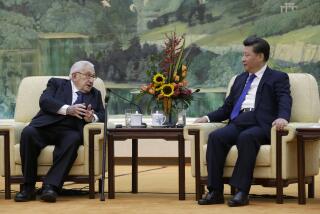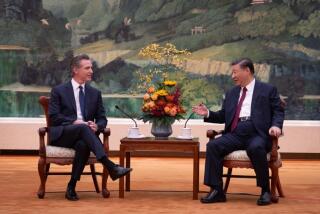RICHARD NIXON: 1913-1994 : Nixon Planned Milestone Opening to China for Long Time, Book Says : Diplomacy: In Taipei in 1965--four years before becoming President--he said U.S. had to improve relations with People’s Republic of China.
- Share via
WASHINGTON — When Richard Nixon sat down for a private chat with senior U.S. diplomat Arthur W. Hummel Jr. in Taipei’s Grand Hotel in 1965, what he said took Hummel by surprise.
Nixon, then an out-of-office Republican warhorse and devout anti-Communist, asserted that Chiang Kai-shek’s Nationalist regime would never achieve its dream of returning to mainland China. And so, Nixon said, U.S. relations with the People’s Republic of China would have to be improved.
“He said that in the hotel room, with all the microphones in it,” recalled Hummel with wonder, meaning that Taiwan’s intelligence service was probably monitoring what Nixon was saying and would report it back to Chiang.
That incident--first reported in a newly published book about Taiwan by Georgetown University historian Nancy Bernkopf Tucker--appears to show that the origins of Nixon’s milestone opening to China date back earlier than was previously known.
They also bolster other recent historical evidence that gives more of the credit for the China diplomacy to Nixon and less to Henry A. Kissinger, Nixon’s national security adviser and later secretary of state.
The Taipei conversation took place four years before Nixon entered the White House and six years before he stunned the world with the announcement that Kissinger had made a secret trip to Beijing.
At the time, the United States had no diplomatic relations with Beijing and recognized Chiang’s Nationalist regime on Taiwan as the government for all of China. Moreover, the United States was in the middle of the Vietnam War, in which China was supporting and supplying America’s enemies.
The 1971 announcement, together with Nixon’s own presidential visit to China the following year, marked one of the fundamental turning points in the history of the Cold War. It opened the way for extensive strategic cooperation between Washington and Beijing to offset the military power of the Soviet Union.
Until now, histories of the Nixon-Kissinger initiative to China have invariably started with an article called “Asia After Vietnam,” which Nixon wrote for Foreign Affairs magazine in October, 1967, with the help of adviser (and now New York Times columnist) William Safire.
“Taking the long view, we simply cannot afford to leave China forever outside the family of nations,” Nixon said in the article. “There is no place on this small planet for a billion of its potentially most able people to live in angry isolation.”
However, in the article, Nixon did not advocate any new diplomacy with Beijing. And the depth of Nixon’s commitment to a new U.S. policy toward China was hard to judge from that article because it could be written off as merely serving Nixon’s immediate political needs.
The Foreign Affairs piece appeared at a time when he was running for President and was engaged in a public-relations campaign to show that there was a “new Nixon”--more reflective and innovative than the man who had been defeated by John F. Kennedy in the 1960 presidential election.
Hummel’s 1965 conversation seems to demonstrate Nixon’s proposal for improving U.S. relations with China was not a casual or one-shot proposal intended merely for public consumption, but reflected a broader change in his thinking that dated back several years.
At the time they met, Hummel was the deputy chief of mission of the U.S. Embassy in Taipei. He later served as U.S. ambassador to the People’s Republic of China from 1981 to 1985.
Although Kissinger eventually spearheaded the complex diplomacy leading to the U.S. rapprochement with China, several recent histories and memoirs suggest that he was at first reluctant and that the idea was originally Nixon’s.
Alexander M. Haig, who served as deputy national security adviser at the time, recalled in a recent book that in early 1969, Kissinger returned from a conversation with Nixon and, rolling his eyes in disbelief, said the President wanted to normalize relations with Beijing.
“Kissinger was at first skeptical about any quick opening to China, and it was Nixon’s dogged vision that propelled the initiative,” wrote Walter Isaacson in his recent biography of Kissinger. “On one trip early in 1969, (White House Chief of Staff H.R. (Bob) Haldeman) talked to Nixon on the plane and then came to sit next to Kissinger.
“ ‘You know,’ Haldeman said, ‘he actually seriously intends to visit China before the end of the second term.’
“Kissinger took off his glasses, polished them slowly, smiled and replied, ‘Fat chance.’ ”
More to Read
Sign up for Essential California
The most important California stories and recommendations in your inbox every morning.
You may occasionally receive promotional content from the Los Angeles Times.













